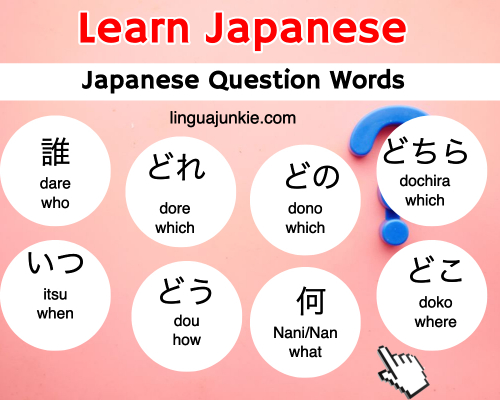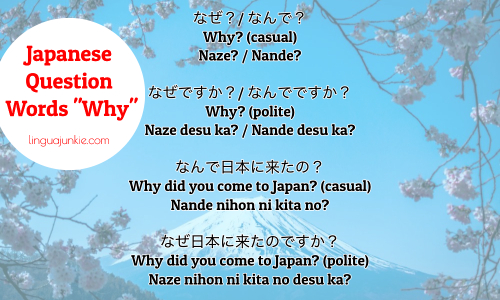Unraveling the Japanese Query Phrases: What, The place, When, Why, and How
Associated Articles: Unraveling the Japanese Query Phrases: What, The place, When, Why, and How
Introduction
On this auspicious event, we’re delighted to delve into the intriguing matter associated to Unraveling the Japanese Query Phrases: What, The place, When, Why, and How. Let’s weave attention-grabbing info and supply contemporary views to the readers.
Desk of Content material
Unraveling the Japanese Query Phrases: What, The place, When, Why, and How

Japanese, a language wealthy in nuance and context, presents a novel problem to learners in relation to questioning. Whereas English depends closely on inverting the topic and verb, Japanese employs a extra refined system of query phrases and sentence particles to assemble interrogative sentences. This text delves into the intricacies of the 5 core query phrases – what (何, nani), the place (どこ, doko), when (いつ, itsu), why (なぜ, naze), and the way (どのように, dō yō ni) – exploring their utilization, variations, and the refined variations that may considerably influence which means.
What (何 – nani)
Nani is probably the most simple query phrase, instantly translating to "what." Its utilization is flexible, encompassing a variety of inquiries.
-
Asking about objects: 何ですか? (Nan desu ka?) – What’s it? That is probably the most fundamental type, appropriate for figuring out unknown objects. The politeness stage may be adjusted by altering the verb ending (e.g., nani da? is much less well mannered).
-
Asking about actions: 何をしていますか? (Nani o shite imasu ka?) – What are you doing? Right here, nani combines with the verb "to do" (suru) to inquire about an exercise.
-
Asking about issues basically: 何が欲しいですか? (Nani ga hoshii desu ka?) – What would you like? This demonstrates nani’s means to inquire about needs or wants.
-
Asking about professions: 何の仕事ですか? (Nani no shigoto desu ka?) – What’s your job? The particle no signifies possession or affiliation, specifying the kind of work.
-
Asking about contents: 何が入っていますか? (Nani ga haitte imasu ka?) – What’s inside? This exhibits nani used with a verb indicating containment.
The flexibility of nani extends to extra advanced sentences, requiring a deeper understanding of grammatical constructions and particles. For instance, 何について話していますか? (Nani ni tsuite hanashite imasu ka?) – What are you speaking about? Right here, ni tsuite signifies the subject of dialog. The nuances of particle utilization are essential for correct comprehension and efficient communication.
The place (どこ – doko)
Doko interprets to "the place" and is used to inquire about location. Its simplicity belies the vary of contexts during which it may be employed.
-
Asking about an individual’s location: どこに住んでいますか? (Doko ni sunde imasu ka?) – The place do you reside? The particle ni signifies location.
-
Asking in regards to the location of an object: どこにありますか? (Doko ni arimasu ka?) – The place is it? Once more, ni signifies location, and the verb adjustments relying on the thing’s animacy (e.g., imasu for animate objects, arimasu for inanimate objects).
-
Asking about a spot basically: どこに行きますか? (Doko ni ikimasu ka?) – The place are you going? The particle ni signifies the vacation spot.
-
Asking in regards to the origin of one thing: どこから来ましたか? (Doko kara kimashita ka?) – The place did you come from? Kara signifies origin.
-
Asking a few particular a part of a spot: 建物のどこですか? (Tatemononodocodesuka?) – The place is it within the constructing? This demonstrates doko used with a extra particular context.
The effectiveness of doko depends closely on context and the accompanying particles. Understanding the varied particles, resembling de, kara, and e, which point out location, course, and vacation spot, respectively, is crucial for accurately formulating and deciphering questions on location.
When (いつ – itsu)
Itsu means "when" and is used to inquire about time. It is comparatively simple, however the accompanying particles and verb tenses considerably affect the precision of the query.
-
Asking a few common time: いつ行きますか? (Itsu ikimasu ka?) – When are you going? It is a easy query in regards to the time of an motion.
-
Asking a few particular time prior to now: いつ来ましたか? (Itsu kimashita ka?) – When did you come? The previous tense verb clarifies the timeframe.
-
Asking a few future time: いつ帰りますか? (Itsu kaerimasu ka?) – When will you come? The long run tense is essential for specifying the meant time-frame.
-
Asking in regards to the period of an occasion: いつまでいますか? (Itsu made imasu ka?) – How lengthy will you keep? Made signifies "till," specifying the period.
-
Asking a few scheduled time: いつ会議がありますか? (Itsu kaigi ga arimasu ka?) – When is the assembly? This exhibits itsu utilized in a extra formal context.
The precision of itsu questions typically depends on extra info, resembling particular dates or occasions, or context clues throughout the dialog. The power to make use of applicable time expressions and particles is essential for correct and efficient communication.
Why (なぜ – naze)
Naze means "why" and is used to inquire about causes or causes. It is usually a proper phrase, and fewer formal alternate options exist, resembling dōshite (どうして).
-
Asking in regards to the cause for an motion: なぜ来ましたか? (Naze kimashita ka?) – Why did you come? It is a direct inquiry into the motivation behind an motion.
-
Asking about the reason for an occasion: なぜ雨が降っていますか? (Naze ame ga futte imasu ka?) – Why is it raining? This exhibits naze used to inquire a few pure phenomenon.
-
Asking in regards to the rationale behind a call: なぜそれを選びましたか? (Naze sore o erabimashita ka?) – Why did you select that? This demonstrates naze utilized in a extra private context.
-
Searching for clarification for a scenario: なぜ遅れたのですか? (Naze okureta no desu ka?) – Why had been you late? This exemplifies a scenario the place the rationale for a delay is being sought.
Whereas naze is easy, understanding the context and the anticipated depth of the reply is crucial. The response would possibly vary from a easy clarification to an in depth account relying on the scenario.
How (どのように – dō yō ni)
Dō yō ni interprets to "how" and is used to inquire in regards to the method or methodology of doing one thing. Different variations exist, resembling ikaga (いかが) for inquiring about somebody’s well-being or dō (どう) for a extra casual "how."
-
Asking in regards to the methodology of doing one thing: どのようにそれをしましたか? (Dō yō ni sore o shimashita ka?) – How did you do this? This instantly inquires in regards to the course of.
-
Asking about the way in which one thing is completed: どのように料理を作りますか? (Dō yō ni ryōri o tsukurimasu ka?) – How do you cook dinner this dish? This asks in regards to the particular steps concerned.
-
Asking about somebody’s situation: いかがお過ごしですか? (Ikaga osugoshi desu ka?) – How are you doing? This demonstrates a well mannered method to inquire about somebody’s well-being.
-
Asking about somebody’s opinion: どう思いますか? (Dō omoimasu ka?) – What do you assume? This makes use of the casual dō to inquire about somebody’s opinion.
The selection between dō yō ni, dō, and ikaga relies upon closely on the context and the extent of ritual required. Understanding these nuances is essential for navigating social conditions and making certain efficient communication.
In conclusion, mastering the Japanese query phrases – nani, doko, itsu, naze, and dō yō ni – requires greater than merely memorizing their translations. A deep understanding of the accompanying particles, verb conjugations, and the context of the dialog is essential for each asking and understanding questions in Japanese. This text serves as a basis for additional exploration, encouraging learners to delve deeper into the intricacies of Japanese grammar and communication. The extra publicity one has to the language, the extra intuitive the utilization of those query phrases will change into, resulting in larger fluency and confidence in communication.








Closure
Thus, we hope this text has supplied beneficial insights into Unraveling the Japanese Query Phrases: What, The place, When, Why, and How. We hope you discover this text informative and useful. See you in our subsequent article!

